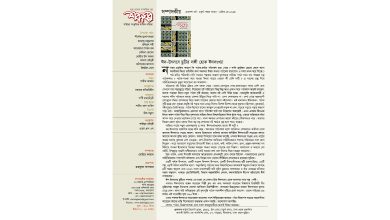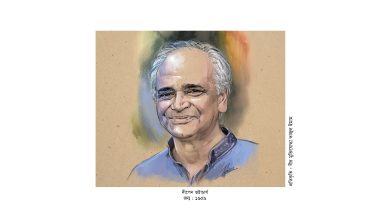Story : Alone, Together : Manju Sarkar
Translated from the Bengali into English by Radha Chakravarty

The two of them go to two different offices. Their ways are separate. They return separately, too. When they are together in the room and next to each other in bed, even then, between the two of them, there remains a considerable distance. Often, the distance seems insurmountable. Even when they turn on their side, they can’t touch each other. A few necessary words are exchanged, but such words don’t build bridges of understanding between hearts. In bed, they remain dejected and tired, entering their respective world of sleep and worry, all alone.
Sometimes, things happen differently. Conjugal habit arouses the desire for union. If the husband awakens, he wants to awaken the wife, or sometimes it’s the wife who wants to awaken the husband. Both seek the warmth of their former lovemaking. Perhaps from such concealed desire, before sinking into the abyss of slumber, Shanta speaks first.
“Listen, are you asleep? Do you know, a funny thing happened at the office today?”
Within the home, these reminiscences about the office strike Arif as intolerable. Still, with a mild eagerness to participate in his wife’s enjoyment, he answers, “Tell me, then.”
“It seems our personnel manager has also fallen in love with me. Gaping at me, he said, ‘How do you retain your figure and your beauty even after keeping house for so many years!` He also asked me out to lunch today. Do you know what answer I gave him?”
“You could have given him some company, the poor soul. What’s the harm in letting him sit beside you in the car, or allowing him to steal a kiss or two when the office is empty!”
“You cad. You think everyone is like you. Ask around and see, what sort of image I have in the office.”
All said and done, her husband is neither a cad nor of a suspicious nature. In her heart of hearts, Shanta certainly accepts this. Perhaps it’s out of affection that she addresses her large hearted-husband a cad. However, encouraging his wife to indulge in illicit romance is not pure mockery on Arif’s part, but also an attempt to accept reality, that’s for sure. Everybody knows that the man in charge of the NGO where Shanta works has a weakness for women. He receives plenty of money from abroad, having started a project for women in distress. But it is said that in his personal life, the company of healthy and beautiful women is his real passion. Having earned the favor of such a man, Shanta has received a promotion at the office, her salary has increased. As her husband, Arif has shared his wife’s joy equally, upon receiving his happy news. Under pressure of work, Shanta comes home late, goes to the office even on holidays. He has never asked her for an explanation. He is a believer in women’s freedom.
Is it to take advantage of her husband’s large-heartedness or due to his lack of amorous feeling that a woman in her mid-youth seeks her own self-worth in the eyes of another man? That Shanta should go to office all dressed up, and grab as much pleasure and liberty as she can, by whatever means, all in the name of looking after the needs of destitute women – these are things that Arif does not object to. But why, nowadays, does she recall illicit amorous interchanges even while lying in bed? As if, even to engage in conjugal relations with her husband, it is necessary to gather excitement from memories or expectations of forbidden relationships. If he offers assent as an enthusiastic listener, then Shanta’s exuberance increases even more. But in his wife’s body, Arif can detect the smell of a woman in distress, instead of love, pity wells up inside him. Glimpses appear in his mind, of the center for women in distress, and of some strong and healthy women he is acquainted with. Then it seems that his sexual desire becomes tinged with contempt and even a degree of violence. Holding his wife in a tight embrace, Arif can tell that, even with her head placed on his chest, Shanta is lost, seeking climactic release elsewhere. Then, full of tedious distaste and fatigue, they lie facing each other. Silently, they enter their respective worlds of sleep and worry.
II
The double income keeps the household running. Shanta pays the entire rent. The remaining responsibilities are Arif’s. Even then, a lot of things remain unaccounted for. Because Shanta earns a higher salary, she takes on a greater portion of the household liabilities. She can’t even spend her own earnings freely, the poor thing. Even then, there is no end to Arif’s demands upon his wife. He doesn’t openly ask for favors. But he knows various strategies for putting pressure on his wife.
When self-interest dictates, Arif’s sympathy for his wife knows no bounds. The previous day, Shanta had shopped for groceries on her way home from work. Even though he knows this, Arif pretends to be a slave to his wife’s demands when he says, the next evening, “Why, my dear, tell me if anything is required from the market, I’ll get it.” Upon being told that he doesn’t need to go to the market, Arif relishes his freedom from responsibility, saying, “I feel like having a cup of tea made by your very own hands. It’s been a long time.”
Just as he loves Shanta’s income, no less does Arif love to eat food that she has cooked. But when she returns home, carrying with her the fatigue of office work and that of traveling to and from her workplace, Shanta feels annoyed at the very thought of entering the kitchen. She eats the food cooked by the maidservant, without complaint. But when he sits down to eat, Arif often grumbles. So, to please her husband’s palate, Shanta has to enter the kitchen now and then, even if she doesn’t want to. She makes him the kind of tea he likes, mixing thickened milk with the strong brew. Today, having sipped his tea, her satisfied husband’s affection is so abundant, that it extends not only to his wife, but also to her kith and kin.
“Have you heard from your family? After retirement, Allah knows how they are managing to run their household on Abba’s meager pension.”
Her husband’s tension about his in-laws caused Shanta’s suspicions to grow sharper. Arif is not unaware of her sense of responsibility as the eldest daughter of the house. Even last month, she has secretly given her younger brother a thousand takas, keeping an alert gaze on Arif, Shanta answers, “Yes, Abba had hoped that I would offer him some relief by taking on the responsibility for at least one of my siblings.”
“It is very natural to harbor such hopes. And for middle-class families like ours, it is a moral responsibility for the eldest offspring to perform some duties of this nature. I’ll tell you what you can do; bring Kanta over to Dhaka and admit her to college here. We’ll take care of her education and marriage.”
The man who never enquires about his own daughters’ education – why would he show so much eagerness today, to fulfill his duties toward his wife’s younger sister? Not quite able to understand her husband’s intentions, Shanta adopts a mocking attitude, and asks him directly: “What’s the matter? Why such concern for your shali, all of a sudden! Has Kanta written to you?”
“Why would she write to me? If we take responsibility for Kanta, Abba-Ma would feel a little lighter. Besides, if she could live in Dhaka, Kanta would be happy too”.
“But Kanta is studying in college there. It would make Abba-Ma happier if we brought Jamal over, rather than her. Why aren’t you thinking of Jamal?”
“We stay out all day. If Kanta lived here, it would help children. Besides, she’s attractive. If we keep her in Dhaka, it would become easy to find a good match for her.”
Just as it had been convenient for her husband to have a young maidservant in the house, Kanta’s arrival would be even more convenient – this is a truth that Shanta understands. All the same, she doesn’t want to reduce her husband’s self-esteem by expressing any suspicion. For his part, as if to make it clear that there is no hidden motive behind his proposal, he quickly alters his resolution.
“Very well then, bring Jamal here instead of Kanta.”
Shanta now declares her resolution in a firm voice: “No. There’s no need to bring anybody here. As it is, our earnings are not enough to run the household property. I don’t have the courage to take on the responsibility of a college-university-going person. Instead, I would rather send some money now and then, if I can.”
“But meanwhile, there’s another person due to arrive here, to become a burden on us. It’s a blood-relationship, there’s no way I can avoid it. Whether we can or not, we must try to bear the load.”
At the end of the long preliminaries, Arif directly announces the real news. His youngest brother has passed the matric examination at his village. Now, it is Arif who must be entirely responsible for his future. They don’t have a father. This is their mother’s decision. The coming week, his mother will arrive in Dhaka, accompanied by his youngest brother. It doesn’t take Shanta long to understand that his concern for his in-laws was intended to make his own mother and brother acceptable to his wife. The decision has been taken without taking her opinions into account. She can’t accept this easily.
Arif consoles her, “That’s why I had told you, Shanta, that taking responsibility for one person amounts to the same thing as taking responsibility for two. It will be a little difficult for us. But it can’t be helped. You write home for Jamal to come here.”
Shanta doesn’t answer. In silence, she moves away from her husband’s side.
III
Silently moving away from her husband’s side declared an impending separation, but this was something that Shanta did not understand at first. Once she is alone, her heart gradually makes this apparent. The arguments in favor of dissociating herself from her husband’s household arise spontaneously from the situation in the household. In bed, at night, Shanta makes the announcement in a dispassionate, clam voice.
“Listen, I want to serve notice to the landlord tomorrow. It’s not possible for me to pay so much rent to live in this house.”
“What does that mean?”
“In the area near my office, I’ll rent a tiny place to live in, and move in there with my daughters. Of course, you can retain this accommodation if you wish. Or, you could rent a separate place where you could stay with your mother and brother.”
Arif has displayed the kind of large-heartedness required of him to tolerate all the demands of his in-laws’ family, before offering a place in his house to his mother and younger brother. He has shown equal respect to his wife, in his willingness to keep her brother or sister together with his own brother. But Shanta can never regard her mother-in-law and brother-in-law as her own kin. All the same, Arif had not expected such an extreme reaction. Even after a long silence, he is unable to come to terms with the blow. He feels aggrieved. His anger grows, too.
“What’s the matter? Why don’t you speak?”
“It seems you are announcing our separation. But what if I don’t permit our daughters to go with you?’
“All the better. The responsibility for your daughters would be yours. If I’m on my own, I, too, would be able to assume greater responsibility for my parents.”
Why only her parents? In a separate house, she would be able to live freely with all those dissolute men. Lewd woman that she is. Although the curses are on the tip of his tongue, Arif controls himself, gritting his teeth. He only says, in a grave tone, “Shanta, you’re really a very selfish girl.”
“Is it me who’s selfish, or you?”
“If I were selfish, I would disown responsibility for my mother and younger brother. I would have no sympathy for anyone from your family.”
“Actually, you’re a fraud. A hypocrite. I hate you.”
“You earn twice as much as I do. Of course you would hate me.”
“You only take note of my earnings. If it were not for my job, I wouldn’t have more respect that a maidservant in your household.”
“Your mentality and attitude are baser than a maidservant’s.”
“That’s bound to happen. For someone whose taste doesn’t stop him from sleeping with women of the street and maidservants, his wife’s mentality and attitude are bound to appear base.”
“Don’t scream in middle of the night.”
“Is your heart wounded at the mention of your old lovers?”
“I’m not interested in quarreling with you. Break away, and cling to someone else – you must leave this household tomorrow.”
“Why should I leave? Who pays the rent for this house? If someone must leave, it would have to be you.”
“Again you show off about your wealth, you whore! Contemptible person!”
“Watch out, don’t touch me.”
Just then, from the next room, their ten-year old daughter Riya comes running. Adopting the role of a guardian, she scolds her parents: “Why are you quarreling, so late in the night? Piya will wake up.”
By now, Shanta has got to her feet, having climbed off the bed. Eyes brimming with tears, she declares her ultimate resolution in a firm voice: “No, no more quarreling. It’s all over. From now on, you will live with your father.”
Leaving her daughter with the father, Shanta swiftly moves into the next room.
“What’s the matter, Baba? Why did you scold Ma?”
Scolding apart, if Arif could have slapped her hard on both cheeks, he would have relished the joy of having given her a parting gift. But because he is unable to do so, a murderous rage against his wife that would shatter his household, surges and swells inside his bosom. Looking at his daughter, Arif controls himself. If he had embraced his daughter and cried, some of the pain inside him may have subsided. But the sight of Riya’s harsh, unsympathetic gaze dampens his emotion.
Clasping his daughter’s hand, he says, in a voice distorted with pain: “From now on, your mother will live separately. The two of you will live with me, my girl.”
Wrenching her hand free, Riya informs him: “No. I shall live with Ma, too.” Then, she goes into the next room.
IV
Looking at the well-arranged household, it would not appear that the relationship between husband and wife is on the rocks. Of course, the maidservant who plays a major role in keeping the household in order and operational, continues to perform her duties as usual. Arriving from the village, Shanta’s mother and brother-in-law cannot detect the fire of discontent anywhere within the household. Spending the entire day at work, Shanta returns home to resume her everyday role, smiling and conversing with her in-laws as before, asking after their well-being, telling Riya and Piya to study and ordering her maidservant to perform all sorts of tasks.
One day, when Shanta returns home from work, her mother-in-law makes a mild complaint: “Arif returns during the late afternoon. How is it that you return from work so late in the evening!”
Shanta replies, smiling, “Your son is employed with the government. Mine is a non-governmental job. They pay twice as much, but also extract more work. They’d make us work all night if they could.”
Both of them evince neither the urge not the courage to display any more suppressed animosity, beyond what is expressed in such words between mother-in-law and daughter-in-law.
As if to cancel the threatened conjugal relationship between husband and wife, and to delay either impending separation, unexpected guests arrive at their house one morning. They are Shanta’s father, mother and sister. They have arrived without prior notice. Both husband and wife are very surprised, and suspicious of each other. Shanta thinks that Arif has perhaps secretly contacted her parents to bring them over, just to teach her a lesson. Seeing Kanta, her suspicions grow sharper. Meanwhile, Arif thinks that it must be Shanta who sent urgent summons to her parents, in order to take revenge, or to confirm the matter of their separation. But their suspicion does not last very long. It is from Shanta’s father that they hear the news first. Shanta’s mother is unwell, from time to time, she feels sudden pain in a corner of her abdomen. Having examined her, the local doctor has advised them to consult a professor at the Dhaka PG at the earliest. That is why they have set out without giving them prior notice. Kanta also insisted on accompanying them.
Arif is not satisfied with merely welcoming and offering consolation to his in-laws. He takes personal responsibility for making an appointment with the doctor. Before leaving for work, he rushed to the market. To compensate for his inability to love his wife, Arif seems over-eager to dance in attendance over his in-laws. Not only does he bear the burden of taking his mother-in-law to the doctor, he also takes the lead in the matter of procuring the money to cover the expenses. For this purpose, he does not hesitate to borrow money. Even if Shanta and he were to separate, his in-laws would surely speak of the goodness of their former son-in-law. Even in the midst of all this trouble, Arif does not stint an expressing abundant affection and benevolence towards his sister-in-law, by means of jocular conversation and pointed his sister-in-law, by means of jocular conversation and pointed glances, whenever he gets an opportunity. To compensate for the emptiness in his conjugal life, he remains constantly busy with the guests in his household.
But at night, Arif feels quite lonely. In his attempt to make convenient sleeping arrangement for everyone, he finds himself in an uncomfortable situation. He sleeps alone on the drawing room sofa. There’s no way to hang up a mosquito net. A mosquito repellant coil burns below. Sleep does not come easily. After their quarrel, Shanta has not spoken to him yet. Her ways are quite mysterious. Even if not on speaking terms, she could still visit the drawing room at night, to personally see to her husband’s comfort. But she doesn’t come. Kanta is free to come into this room to chat with her insomniac brother-in-law. But perhaps she doesn’t dare come here, for fear of her sister. At night, alone with all these thoughts, Arif burns silently like the coil.
The following afternoon, when it’s time to leave office, Riya comes to her father as her mother’s emissary.
Arif had forgotten about going with his family to Mohammadpur to attend a party at the house of a relative. He is surprised to find that Shanta remembers. Annoyed, he tells his daughter, “Go with your mother. I am not going.”
“It’s Ma who says you should get ready. Just the four of us will go. Put on your shirt and trousers quickly.”
Is it on account of their daughter’s excessive enthusiasm, or from eagerness to re-establish conjugal relations, or is it simply to keep up appearances to preserve social propriety, the husband and wife go out together, dressed to the nines? They themselves are not quite sure. Their children are with them. The visitors in their own household are quite pleased to watch the whole family dress up to be someone else’s guests. The two children are happiest.
They sit side by side on the rickshaw. The two girls are seated on their parents’ laps. When the rickshaw comes to a standstill, caught in the traffic jam on the main road, Arif looks at his wife. He is the first to speak: “In these few days, I have ended up borrowing almost one and a-half thousand takas”
Moving her eyes away from her husband’s face, Shanta answers: “My debts in the outside world are growing, too.”
Their path obstructed, the two of them remain gazing in opposite direction.
Manju Sarkar : Fictionist in Bangla Literature
Illustration : Rajat




